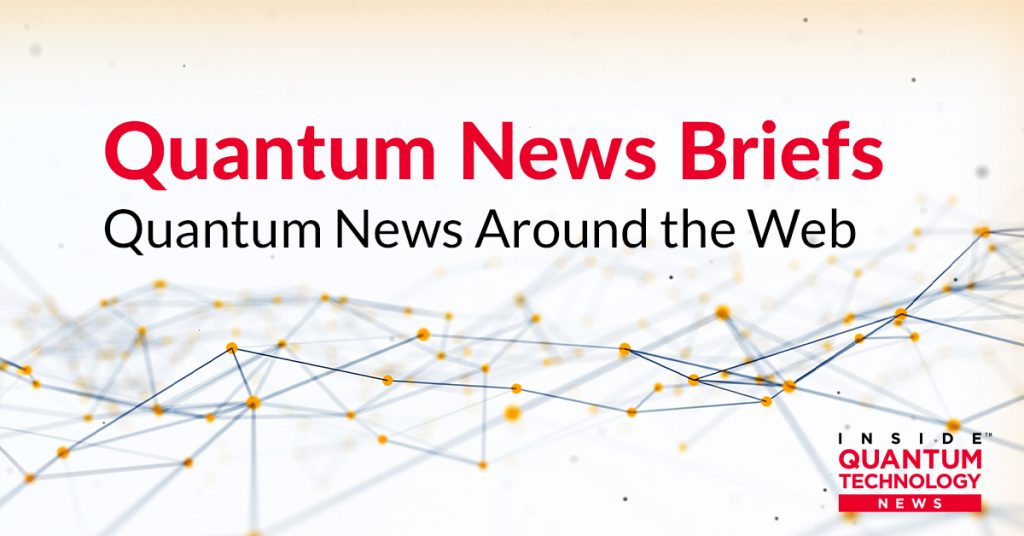Quantum News Briefs September 15 begins with Dr. John’s Lin’s warning of a retrospective post-quantum problem and moves to the UK where quantum photonics spin-out AegiQ has received backing from Innovate UK to develop world’s first deployable quantum light source. Third, Aliro Quantum Expands Executive Team With First Chief Marketing Officer, Michael Wood & MORE.
*****
A retrospective post-quantum problem
Dr. Lin explains that pre-quantum public-key encryption algorithms such as RSA have almost certainly been used to protect nearly all classified U.S. government messages since the 1970s, when the mathematics for public-key encryption were first discovered. A properly encrypted message is useless to anyone without the decryption key or the technology to discover that key, but even encrypted messages can be recorded for future analysis.
In a PQC world, those recorded encrypted messages will be vulnerable to decryption. In their decrypted form, they potentially hold a treasure trove of secrets. Though these are secrets from the past, decrypted messages may reveal embarrassments and dangers with potentially detrimental policy implications for today and tomorrow.
Policymakers would be wise to consider the very real possibility that in a PQC world, messages they once believed would be kept secret could in fact be made public. The adversary cannot be confident that it will be able to retrieve a large volume of interesting information from its trove of encrypted recorded messages, at least not in the immediate aftermath of a true quantum computing breakthrough. Still, the United States cannot be fully confident that any of its secrets encrypted with pre-quantum algorithms will never be revealed. Thus, the danger that such secrets will be revealed will only grow, as the adversary is able to devote more quantum computing resources to the process of retrospective decryption.
Dr.Lin closes, “Policymakers have the distinct luxury of knowing that a data breach is looming in the future, even though they do not know precisely when it will occur. Every U.S. government agency that has sent a confidential message in the past should have at least a small effort devoted to developing plans for what that agency should do if and when particularly sensitive messages from the past are revealed in the PQC future.” Click here to read original Lawfare.Blog article in full.
IQT Quantum Cybersecurity Conference & Exhibit in New York City, October 25-27
*****
Quantum photonics spin-out AegiQ gets backing from Innovate UK to develop world’s first deployable quantum light source
The £500K project, which is in collaboration with Fraunhofer CAP, will see Aegiq bring to life a ‘linchpin’ for many quantum applications, including its work alongside BT and Arqit on the next generation of quantum communications.
Aegiq also recently secured more than £4 million in combined non-dilutive and equity investment led by High-Tech Gründerfonds in a syndicate with Black Quant and Quantum Exponential and private angels. Prior to this, the company was awarded funding for several projects supported by Quantum Technologies Challenge with total value of the funded consortia exceeding £20 million.
Aegiq’s technology will provide significant performance uplift for quantum communications and QKD applications, as well as opening doors for large-scale quantum networking with quantum computing and new quantum information processing protocols.
Leveraging a high-purity single-photon output rate, Aegiq will lower the cost and boost the performance of single-photon sources, surpassing rates that are currently available from commercial lasers. This is ideal for delivering high-speed quantum key distribution and quantum information processing, as well as being a brighter source for imaging or sensing applications.
The funds will be used to develop a field-deployable high-performance quantum light source integrated solution in partnership with Fraunhofer CAP.
*****
Aliro Quantum Expands Executive Team With First Chief Marketing Officer, Michael Wood
Wood will lead Aliro’s global marketing initiatives and will be responsible for messaging, positioning, growth marketing, demand generation, analyst, and media relations. He brings more than 30 years of experience in enterprise networking, security and software, as well as a passion for launching new solutions, categories and technologies. Wood joins Aliro from Versa Networks where he built and led the marketing organization. He has also held senior leadership positions at VMware, VeloCloud Networks, Akamai and Cisco. Wood joins recent appointee, Michael Gaffney, Aliro’s Head of Public Sector, on the company’s senior management team. Gaffney recently opened Aliro’s Washington D.C. presence to support the company’s expanding government and public sector initiatives following a career in Army intelligence and years implementing cloud and security solutions for the government.
“With Michael Wood and Michael Gaffney aboard, Aliro will continue its impressive growth,” said Dr. Prineha Narang, founder and Chief Technology Officer with Aliro. “The respective experience and enthusiasm these two leaders bring to the company will accelerate our mission to build the first scalable quantum networks.”
*****
Building better quantum sensors with blips in a diamond’s crystal structure
Their new approach, published in PRX Quantum, takes advantage of the way defects in diamonds or semiconductors behave like qubits—the smallest unit of quantum information.
“Researchers are already using this kind of qubit to make really amazing sensors,” said Prof. Aashish Clerk, senior author of the new work. “What we’ve done is come up with a better way of getting the most information we can out of these qubits.”
For engineers trying to develop quantum sensors that measure everything from magnetic fields—for better navigation or analysis of molecular structures—to temperature changes inside living cells, the new approach offers a much-needed improvement in sensitivity.
“In the past, the very noisy final readout of qubits in these sensors has really limited everything,” said Clerk. “Now, this mechanism gets you to a stage where you don’t care about that noisy final readout; you’re focused on the more valuable data encoded before it.”
*****
Sandra K. Helsel, Ph.D. has been researching and reporting on frontier technologies since 1990. She has her Ph.D. from the University of Arizona.
